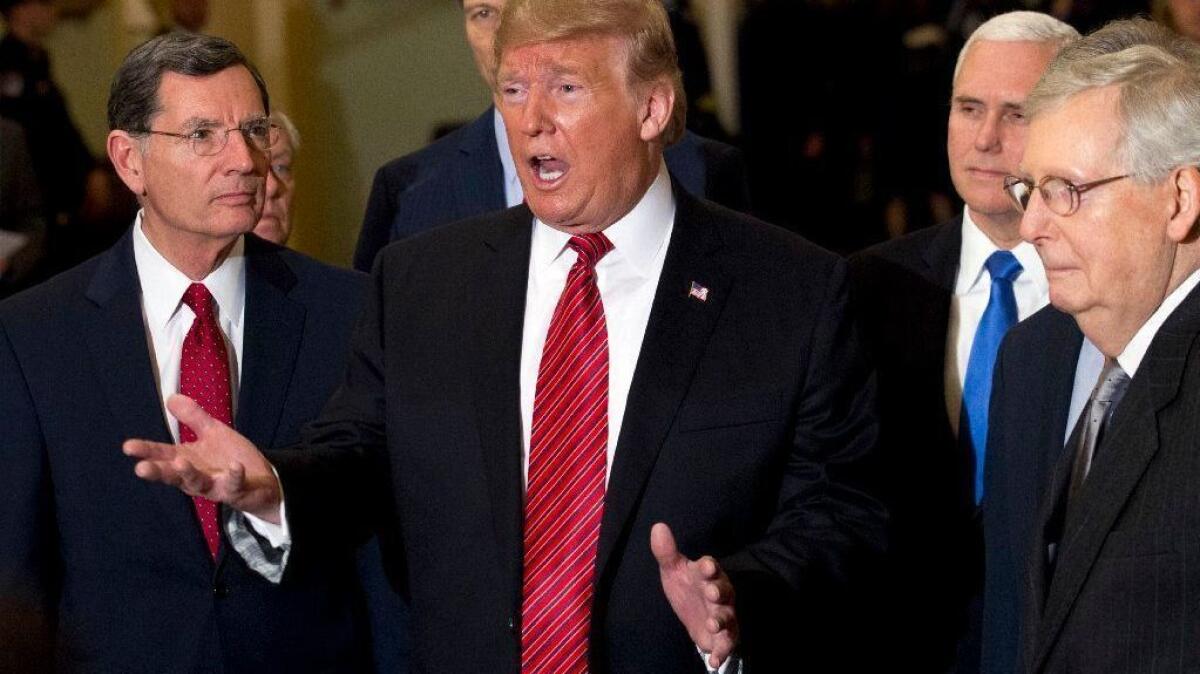Trump walks out of shutdown talks when Democrats reject funds for his border wall

Reporting from Washington — A day after calling for a bipartisan compromise to resolve the partial government shutdown, President Trump stormed out of a White House negotiating session Wednesday when Democratic leaders refused to agree to his demand for taxpayer funds to build a southern border wall.
“Just left a meeting with Chuck and Nancy, a total waste of time,” Trump tweeted afterward. He said he asked House Speaker Nancy Pelosi (D-San Francisco) and Senate Minority Leader Charles E. Schumer (D-N.Y.) if they would agree to end the shutdown, now in its 19th day, in return for funds for a wall or steel barrier, one of his major campaign promises.
“Nancy said, NO. I said bye-bye, nothing else works!” the president tweeted.
Democratic leaders accused the president of throwing a temper tantrum.
“The president slammed the table, asked Speaker Pelosi if she would support his wall and when she said no, he walked out and said, ‘We have nothing to talk about,’” Schumer said. “He didn’t get his way and he just walked out of the meeting.”
Pelosi said a wall will not resolve the problems currently experienced at the border. “What Trump is claiming to be the situation at the border is not solved by a wall,” she said.
Rep. Kevin McCarthy (R-Bakersfield), the House minority leader, said talks had been complicated because of Democrats’ hard-line stance, refusing to budge on the wall or even enter serious negotiations until the government is reopened.
“It is a real challenge when the Democrats won’t even give an offer back,” he said.
The hostile 20-minute encounter marked a shift for Trump, who previously had spoken about the progress being made during talks and his optimism that a resolution would be found.
That began to shift this week when the White House floated the idea of bypassing Congress entirely and declaring a national emergency at the border, which the administration believes will enable it to use military funds to build the wall. The idea is controversial on Capitol Hill, where lawmakers value their constitutional authority to appropriate money. But some Republicans view it as a political way out of the shutdown debacle.
The clash in the White House on Wednesday also suggested the shutdown was likely to become the longest on record, a threshold it will pass on Saturday. Lawmakers of both parties said they saw no immediate path forward.
The White House theatrics did little to mask the uphill battle facing Trump, whose demand for $5.7 billion in funds for a border wall precipitated the government shutdown last month.
Despite a White House offensive this week — including a rare Oval Office prime-time address Tuesday, a trip to Capitol Hill on Wednesday and a visit to the southern border Thursday — some Republicans are beginning to get nervous about the backlash they may face as the pain from the shutdown grows.
More than 800,000 workers have been furloughed, with many being forced to work without pay. Paychecks due Friday are not expected to arrive, forcing many families to miss mortgage payments, put off medical procedures or juggle bills.
“I think the president thinks there will be increasing pressure on everybody to come to the table once people start missing their paycheck. Sadly, these people are collateral damage,” said Sen. John Cornyn (R-Texas). “There’s going to be significant political pressure on everybody when workers and contractors start missing their paychecks and can’t pay their rent or their mortgage or put food on the table.”
Polls have shown that Americans increasingly blame Trump for the disruption, rather than Democrats.
Trump tried to assuage GOP concerns by meeting with rank-and-file Senate Republicans on Wednesday and urging them to stay united. Just an hour before he left the negotiation with congressional leaders, he asked Senate Republicans to “hang together,” according to two senators in the room.
“The president’s message to all of us was hang together,” Cornyn said. “It’s like what Benjamin Franklin said at the constitutional convention: Are we going to hang together or hang separately.”
But some Republicans fear Trump will just leave them hanging. About half a dozen Senate Republicans have publicly urged Trump to reopen the government, even without getting the border money. They include Sens. Cory Gardner of Colorado and Susan Collins of Maine, both of whom will face voters in 2020.
The senators who have come out publicly against the shutdown “reaffirmed those” positions in the meeting, Cornyn said.
Alaska Sen. Lisa Murkowski, who often votes independently from the GOP caucus and is among those urging Trump to end the shutdown without wall money, reminded Trump during the meeting that Americans were starting to feel the pain, according to NBC.
Senate Majority Leader Mitch McConnell (R-Ky.) said Republicans stood with the president but declined to answer any other questions about the negotiation. “We’re sticking with the president on this,” he said.
But the White House PR campaign this week hasn’t gone as smoothly as hoped, partly because Trump has at times seemed to undercut the unity message and distanced himself from the shutdown. He reportedly complained to broadcasters Tuesday that he didn’t think the Oval Office address or border trip were smart ideas, and his aides were making him do it.
In December, Trump said he would gladly “own” the shutdown, but on Wednesday he told reporters: “This is not a fight I wanted. I didn’t want this fight.” He also complained to Democrats during the contentious White House meeting that he “didn’t want to do this meeting. They told me I had to,” according to Sen. Richard J. Durbin (D-Ill.), who attended.
At the White House, staffers inured to the president’s unpredictable asides and outbursts acknowledged that his recent complaints about his own efforts to resolve the shutdown stalemate weren’t likely to strengthen his position.
“We’re all used to it,” one senior aide said, speaking on the condition of anonymity. “The mixed messages don’t help our cause, but he’s going to say whatever he’s going to say.”
In the House, Republican support for the president remained strong. Even so, eight GOP lawmakers joined Democrats to vote to reopen the Treasury Department on Wednesday night. Last week, seven Republicans voted with Democrats on a similar bill to fund the government.
Several Republicans are considering legislation to try to negotiate a compromise between funding the border wall and offering protections for young adults who arrived in the United States as children, known as “Dreamers.”
Sen. Lindsey Graham (R-S.C.), who is close with Trump, is working on an outline. Moderate Republican Rep. Mario Diaz-Balart of Florida introduced an amendment in the House and several other Senate Republicans, including Sens. John Thune of South Dakota, Rob Portman of Ohio and Jerry Moran of Kansas, are putting together a proposal.
Democrats have dismissed the idea, and Schumer on Wednesday said including immigration in the shutdown fight would only make it more difficult to reopen the government.
Also, Democrats note that Trump previously reneged on a similar deal he reached with them last year to provide border wall money in exchange for help for Dreamers.
Some House Republicans are warming to the idea of Trump declaring a national emergency to build the wall. That could clear the way for the government to reopen by removing the stalemate over including wall funds in the must-pass spending bills.
Though an extreme step, a national emergency declaration could be portrayed as a political win for all sides. Democrats could say they held strong and refused Trump’s demands for border wall money. Trump and Republicans could say they were keeping their promise to build a wall by using the military instead.
The fight over the wall would continue, but it would shift from Congress to the courts, which would then have to decide whether Trump has the authority to do it.
Times staff writers Noah Bierman and Sarah D. Wire in Washington contributed to this report.
More to Read
Get the L.A. Times Politics newsletter
Deeply reported insights into legislation, politics and policy from Sacramento, Washington and beyond. In your inbox three times per week.
You may occasionally receive promotional content from the Los Angeles Times.












